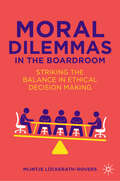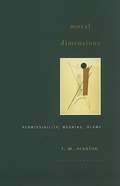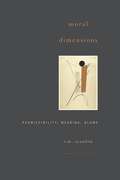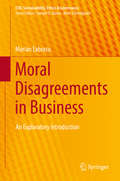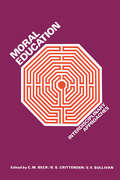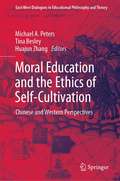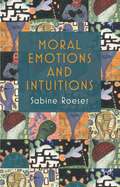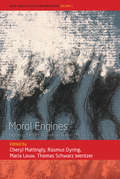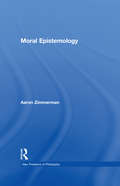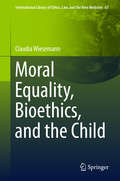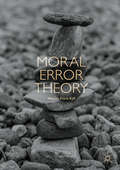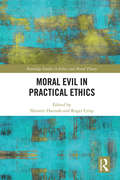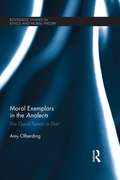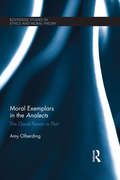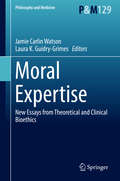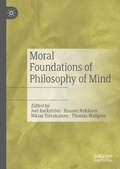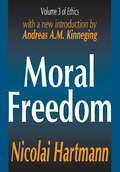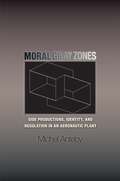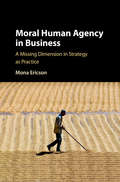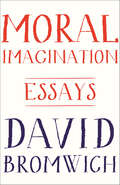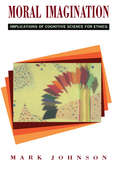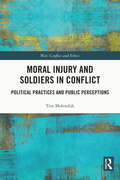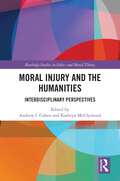- Table View
- List View
Moral Dilemmas in the Boardroom: Striking the Balance in Ethical Decision Making
by Mijntje Lückerath-RoversIn the boardroom, executive and non-executive directors must frequently make decisions balancing competing interests and conflicting moral norms, with their actions impacting employees, customers, shareholders, and society at large. These decisions are not always understood, frequently criticised, and sometimes deemed immoral or unethical. Disbelief over the apparent mismatch between the actions of the company and the moral norms of wider society can damage the corporate reputation and lead to embarrassing U-turns. However, despite the importance of these decisions and the interest they generate, we rarely ask how these decisions are made? What role do moral norms and moral identity have in the boardroom? And how do companies sometimes interpret the moral norm so spectacularly poorly? The picture revealed is of a decision-making process that is neither simple nor morally black-and-white. This eye-opening book examines the role of moral judgement in the boardroom and how the actions and behaviours of directors in tackling moral dilemmas can lead to wildly different outcomes and consequences. It includes forensic breakdowns of recent, high profile boardroom decisions, with alternative outcomes explored and assessed. The detailed descriptions of the case studies include the moral dilemmas and the subsequent decisions of the directors of Adidas, Bud Light, Ajax, Yahoo!, G-Star, and many others. This book provides practical guidance for corporate decision-makers looking to assign the right weight to conflicting moral norms and interests, as well as all those seeking to gain more insight into the workings of the boardroom.
Moral Dimensions: Permissibility, Meaning, Blame
by T. M. ScanlonScanlon reframes current philosophical debates as he explores the moral permissibly of an action. Blame, he argues, is a response to the meaning of an action rather than its permissibly. This analysis leads to a novel account of the conditions of moral responsibility and to important conclusions about the ethics of blame.
Moral Dimensions: Permissibility, Meaning, Blame
by T. M. ScanlonIn a clear and elegant style, T. M. Scanlon reframes current philosophical debates as he explores the moral permissibility of an action. Permissibility may seem to depend on the agent’s reasons for performing an action. For example, there seems to be an important moral difference between tactical bombing and a campaign by terrorists—even if the same number of non-combatants are killed—and this difference may seem to lie in the agents’ respective aims. However, Scanlon argues that the apparent dependence of permissibility on the agent’s reasons in such cases is merely a failure to distinguish between two kinds of moral assessment: assessment of the permissibility of an action and assessment of the way an agent decided what to do. Distinguishing between these two forms of assessment leads Scanlon to an important distinction between the permissibility of an action and its meaning: the significance for others of the agent’s willingness to act in this way. An action’s meaning depends on the agent’s reasons for performing it in a way that its permissibility does not. Blame, he argues, is a response to the meaning of an action rather than its permissibility. This analysis leads to a novel account of the conditions of moral responsibility and to important conclusions about the ethics of blame.
Moral Disagreements in Business: An Exploratory Introduction (CSR, Sustainability, Ethics & Governance)
by Marian EabrasuThis book disassembles the moral assessment of business practices into its constituent parts to identify and clarify the four key concepts that form the basis of important moral disagreements in business: ‘personhood,’ ‘ownership,’ ‘harm,’ and ‘consent.’ ‘Moral bottom lines’ are those fundamental concepts in business ethics that ultimately account for our most resilient moral claims and unsurpassable convictions, and exploring them provides essential insights into the grounds on which we disagree in business ethics. This analysis is useful for students in business school looking to understand fundamental moral disagreements in business and for practitioners interested in connecting practice with their own moral intuitions. The book also challenges scholars of business ethics by arguing that we can reduce business ethics disagreements to these four issues."This is the most refreshing book on business ethics to appear in a long time. By focusing on 'personhood,' 'ownership,' 'harm,' and 'consent,' Eabrasu brings a new level of clarity and insight into disagreements on business ethic issues. Rather than reaching for an artificial utopian resolution, he embraces the challenge of explaining why we disagree. This is a must-read for serious business ethic scholars."Nicolas CapaldiLoyola University New OrleansLegendre-Soulé Distinguished Chair in Business Ethics
Moral Education
by Edmund Sullivan Clive M. Beck Brian S. CrittendenThis volume, based on an interdisciplinary conference of psychologists, sociologists, philosophers, and social scientists, explores a topic of vital importance today---moral education. The book is organized around four questions: the nature and scope of moral education, the problem of ethical pluralism, psychological considerations in a program of moral education, and the social structure of the school as it relates to moral education. This volume will interest philosophers and social scientists concerned with human behaviour and values. It will be of special interest to those engaged in educational research, to curriculum planners, and teachers.
Moral Education and the Ethics of Self-Cultivation: Chinese and Western Perspectives (East-West Dialogues in Educational Philosophy and Theory)
by Michael A. Peters Huajun Zhang Tina BesleyEducational philosophies of self-cultivation as the cultural foundation and philosophical ethos for education have strong and historically effective traditions stretching back to antiquity in the classical ‘cradle’ civilizations of China and East Asia, India and Pakistan, Greece and Anatolia, focused on the cultural traditions in Confucianism, Taoism, and Buddhism in the East and Hellenistic philosophy in the West. This volume in East-West dialogues in philosophy of education examines both Confucian and Western classical traditions revealing that although each provides its own distinct figure of the virtuous person, they are remarkably similar in their conception and emphasis on moral self-cultivation as a practical answer to how humans become virtuous. The collection also examines self-cultivation in Japanese traditions and also the nature of Michel Foucault’s work in relation to ethical and aesthetic ideals of Hellenistic self-cultivation.
Moral Emotions and Intuitions
by Sabine RoeserThe author presents a new philosophical theory according to which we need intuitions and emotions in order to have objective moral knowledge, which is called affectual intuitionism. Affectual Intuitionism combines ethical intuitionism with a cognitive theory of emotions.
Moral Engines: Exploring the Ethical Drives in Human Life (WYSE Series in Social Anthropology #5)
by Cheryl Mattingly Rasmus Dyring Maria Louw Thomas Schwarz WentzerIn the past fifteen years, there has been a virtual explosion of anthropological literature arguing that morality should be considered central to human practice. Out of this explosion new and invigorating conversations have emerged between anthropologists and philosophers. Moral Engines: Exploring the Ethical Drives in Human Life includes essays from some of the foremost voices in the anthropology of morality, offering unique interdisciplinary conversations between anthropologists and philosophers about the moral engines of ethical life, addressing the question: What propels humans to act in light of ethical ideals?
Moral Epistemology (New Problems of Philosophy)
by Aaron ZimmermanHow do we know right from wrong? Do we even have moral knowledge? Moral epistemology studies these and related questions about our understanding of virtue and vice. It is one of philosophy’s perennial problems, reaching back to Plato, Aristotle, Aquinas, Locke, Hume and Kant, and has recently been the subject of intense debate as a result of findings in developmental and social psychology. In this outstanding introduction to the subject Aaron Zimmerman covers the following key topics: What is moral epistemology? What are its methods? Including a discussion of Socrates, Gettier and contemporary theories of knowledge skepticism about moral knowledge based on the anthropological record of deep and persistent moral disagreement, including contextualism moral nihilism, including debates concerning God and morality and the relation between moral knowledge and our motives and reasons to act morally epistemic moral scepticism, intuitionism and the possibility of inferring ‘ought’ from ‘is,’ discussing the views of Locke, Hume, Kant, Ross, Audi, Thomson, Harman, Sturgeon and many others how children acquire moral concepts and become more reliable judges criticisms of those who would reduce moral knowledge to value-neutral knowledge or attempt to replace moral belief with emotion. Throughout the book Zimmerman argues that our belief in moral knowledge can survive sceptical challenges. He also draws on a rich range of examples from Plato’s Meno and Dickens’ David Copperfield to Bernard Madoff and Saddam Hussein. Including chapter summaries and annotated further reading at the end of each chapter, Moral Epistemology is essential reading for all students of ethics, epistemology and moral psychology.
Moral Equality, Bioethics, and the Child
by Claudia WiesemannPresenting real life cases from clinical practice, this book claims that children can be conceived of as moral equals without ignoring the fact that they still are children and in need of strong family relationships. Drawing upon recent advances in childhood studies and its key feature, the 'agentic child', it uncovers the ideology of adultism which has seeped into much what has been written about childhood ethics. However, this book also critically examines those positions that do accord moral equality to children but on grounds not strong enough to support their claim. It lays the groundwork for a theory of moral equality by assessing the concepts of parenthood, family, best interest, paternalism, and, above all, autonomy and trust which are so important in envisioning what we owe the child. It does not only show how children - like adults - should be considered moral agents from infancy but also how ethical theories addressing adults can significantly profit from recognizing this. The analysis takes into account contributions from European as well as American scholars and makes use of a wide range of ethical, psychological, cultural, and social-scientific research.
Moral Error Theory
by Wouter Floris KalfThis book provides a novel formulation and defence of moral error theory. It also provides a novel solution to the so-called now what question; viz., the question what we should do with our moral thought and talk after moral error theory. The novel formulation of moral error theory uses pragmatic presupposition rather than conceptual entailment to argue that moral judgments carry a non-negotiable commitment to categorical moral reasons. The new answer to the now what question is pragmatic presupposition substitutionism: we should substitute our current moral judgments, which pragmatically presuppose the existence of categorical moral reasons with ‘schmoral’ judgments that pragmatically presuppose the existence of a specific class of prudential reasons. These are prudential reasons that, when we act on them, contribute to the satisfaction of what the author calls ‘the fundamental desire’; namely, the desire to live in a world with mutually beneficial cooperation.
Moral Evil in Practical Ethics (Routledge Studies in Ethics and Moral Theory)
by Roger Crisp Shlomit HarroshThe concept of evil is one of the most powerful in our moral vocabulary, and is commonly used today in both religious and secular spheres to condemn ideas, people, their actions, and much else besides. Yet appeals to evil in public debate have often deepened existing conflicts, through corruption of rational discourse and demonization of the other. With its religious overtones and implied absolutism, the concept of evil seems ill-suited to advancing public discourse and pro-social relations in a liberal democracy, as evidenced by its use in the abortion debate. International relations have also suffered from references to an ‘axis of evil.’ Recently, however, philosophers have begun reconceptualising evil within a secular, moral framework, using the idea of evil as the worst kind of immorality to inform and shape our responses to issues like torture, genocide and rape as a weapon of war. This book continues this trend, exploring a constructive role for the concept of evil in practical ethics. Part I of the book begins with two examinations of the concept itself, one focusing primarily on its secular manifestations and the other on evil in its religious context. Individuals are perhaps the primary focus of attributions of evil, and Part II looks at two particular manifestations of evil, in bullying and in mass killing, before considering the nature of evil as an immoral character trait. Part III moves beyond the individual to issues of collective evildoing, evil environments, and political evil. The final part considers responses to evil: can some evil be unforgiveable, and to what extent should we ‘enhance’ ourselves morally so as to prevent future evildoing? These essays, written by leading philosophers from around the world, including the late Claudia Card, will take the philosophical debate on moral evil in practical ethics to a new level.
Moral Exemplars in the Analects: The Good Person is That
by Amy OlberdingIn this study, Olberding proposes a new theoretical model for reading the Analects. Her thesis is that the moral sensibility of the text derives from an effort to conceptually capture and articulate the features seen that are identified and admired pre-theoretically and thus prior to any conceptual criteria for virtue.
Moral Exemplars in the Analects: The Good Person is That (Routledge Studies in Ethics and Moral Theory)
by Amy OlberdingIn this study, Olberding proposes a new theoretical model for reading the Analects. Her thesis is that the moral sensibility of the text derives from an effort to conceptually capture and articulate the features seen in exemplars, exemplars that are identified and admired pre-theoretically and thus prior to any conceptual criteria for virtue. Put simply, Olberding proposes an "origins myth" in which Confucius, already and prior to his philosophizing knows whom he judges to be virtuous. The work we see him and the Analects'authors pursuing is their effort to explain in an organized, generalized, and abstract way why pre-theoretically identified exemplars are virtuous. Moral reasoning here begins with people and with inchoate experiences of admiration for them. The conceptual work of the text reflects the attempt to analyze such people and parse such experiences in order to distill abstract qualities that account for virtue and can guide emulation.
Moral Expertise: New Essays From Theoretical And Clinical Bioethics (Philosophy and Medicine #129)
by Jamie Carlin Watson Laura K. Guidry-GrimesThis collection addresses whether ethicists, like authorities in other fields, can speak as experts in their subject matter. Though ethics consultation is a growing practice in medical contexts, there remain difficult questions about the role of ethicists in professional decision-making. Contributors examine the nature and plausibility of moral expertise, the relationship between character and expertise, the nature and limits of moral authority, how one might become a moral expert, and the trustworthiness of moral testimony. This volume engages with the growing literature in these debates and offers new perspectives from both academics and practitioners. The readings will be of particular interest to bioethicists, clinicians, ethics committees, and students of social epistemology. These new essays promise to advance discussions in the professionalization and accreditation of ethics consultation.
Moral Foundations of Philosophy of Mind
by Joel Backström Hannes Nykänen Niklas Toivakainen Thomas WallgrenThis volume brings together a collection of essays that explore in a new way how unacknowledged moral concerns are integral to debates in the philosophy of mind.The radical suggestion of the book is that we can make sense of the internal dynamics and cultural significance of these debates only when we understand the moral forces that shape them.Drawing inspiration from a variety of traditions including Wittgenstein, Lacan, phenomenology and analytic philosophy, the authors address a wide range of topics including the mind/body-problem, the problem of other minds, subjectivity and objectivity, the debates on mindreading, naturalism, reductive physicalism, representationalism and the ‘E-turn’; Dennett’s heterophenomenology, McDowell’s neo-Kantianism, Wittgenstein’s ‘private language’ considerations and his notion of an ‘attitude towards a soul’; repression, love, conscience, the difficulties of self-understanding, and the methods and aims of philosophy. Through a combination of detailed, immanent criticism and bold constructive work, the authors move the discussion to a new level, beyond humanistic or conservative critiques of naturalism and scientism.
Moral Freedom (Ethics Ser. #Vol. 3)
by Nicolai HartmannEthics is Nicolai Hartmann's magnum opus on moral philosophy. Volume 1, Moral Phenomena, is concerned with the nature and structure of ethical phenomena. Volume 2, Moral Values, describes all values as forming a complex and imperfectly known system. The final volume, Moral Freedom, deals with one of the oldest puzzles in both philosophy and theology: the individual's freedom of the will.Freedom of the will is a necessary precondition of morality. Without it, there is no morality in the full sense of the word. In Moral Freedom Hartmann sets out to refute the determinist view that freedom of the will is impossible. Following Kant, while rejecting his transcendentalism, Hartmann first discusses the tension between causality and the freedom of the will.The tension between the determination by moral values and the freedom of the will is next examined, a crucial issue completely overlooked by Kant and virtually all other modern philosophers, but recognized by the scholastics. Why should we believe in the freedom of the will with regard to the moral values? Are there good reasons for thinking that it exists? If freedom of the will vis-a-vis the moral values does exist, how is it to be conceived? Moral Freedom concludes with the famous postscript on the antinomies between ethics and religion.Hartmann's Ethics may well be the most outstanding treatise on moral philosophy in the twentieth century. Andreas Kinneging's introduction sheds light on the volume's continuing relevance.
Moral Gray Zones: Side Productions, Identity, and Regulation in an Aeronautic Plant
by Michel AntebyAnyone who has been employed by an organization knows not every official workplace regulation must be followed. When management consistently overlooks such breaches, spaces emerge in which both workers and supervisors engage in officially prohibited, yet tolerated practices--gray zones. When discovered, these transgressions often provoke disapproval; when company materials are diverted in the process, these breaches are quickly labeled theft. Yet, why do gray zones persist and why are they unlikely to disappear? In Moral Gray Zones, Michel Anteby shows how these spaces function as regulating mechanisms within workplaces, fashioning workers' identity and self-esteem while allowing management to maintain control.The book provides a unique window into gray zones through its in-depth look at the manufacture and exchange of illegal goods called homers, tolerated in a French aeronautic plant. Homers such as toys for kids, cutlery for the kitchen, or lamps for homes, are made on company time with company materials for a worker's own purpose and use. Anteby relies on observations at retirees' homes, archival data, interviews, and surveys to understand how plant workers and managers make sense of this tacit practice. He argues that when patrolled, gray zones like the production of homers offer workplaces balanced opportunities for supervision as well as expression. Cautioning against the hasty judgment that gray zone practices are simply wrong, Moral Gray Zones contributes to a deeper understanding of the culture, group dynamics, and deviance found in organizations.
Moral Human Agency in Business
by Mona EricsonIn recent years, corporate accounting scandals have received considerable media attention, raising concerns about unethical practice in the business world. Faced with a decline in society's trust in business, research into the ethics of organisations and their leaders is now of critical importance. In this timely book, Ericson focuses on the moral human agency involved in business by leading the reader through the full span of the activities involved in coffee production, from-bean-to-cup. Illustrating the ethical implications and opportunities involved in producing Lfbergs coffee, Ericson highlights the importance of the morally-imbued connections made between practitioners and other participants. These activities can contribute to a sustainable, profitable and competitive future whilst, at the same time, accounting for justice through a reciprocity of mutual benefit, respect and meaning. Promoting the reintroduction of ethics in strategy research, this book will be of great interest and use to strategy researchers, business leaders and sustainability directors.
Moral Imagination: Essays
by David BromwichCompelling essays from one of today's most esteemed cultural criticsSpanning many historical and literary contexts, Moral Imagination brings together a dozen recent essays by one of America's premier cultural critics. David Bromwich explores the importance of imagination and sympathy to suggest how these faculties may illuminate the motives of human action and the reality of justice. These wide-ranging essays address thinkers and topics from Gandhi and Martin Luther King on nonviolent resistance, to the dangers of identity politics, to the psychology of the heroes of classic American literature.Bromwich demonstrates that moral imagination allows us to judge the right and wrong of actions apart from any benefit to ourselves, and he argues that this ability is an innate individual strength, rather than a socially conditioned habit. Political topics addressed here include Edmund Burke and Richard Price's efforts to define patriotism in the first year of the French Revolution, Abraham Lincoln’s principled work of persuasion against slavery in the 1850s, the erosion of privacy in America under the influence of social media, and the use of euphemism to shade and anesthetize reactions to the global war on terror. Throughout, Bromwich considers the relationship between language and power, and the insights language may offer into the corruptions of power.Moral Imagination captures the singular voice of one of the most forceful thinkers working in America today.
Moral Imagination: Implications of Cognitive Science for Ethics
by Mark JohnsonUsing path-breaking discoveries of cognitive science, Mark Johnson argues that humans are fundamentally imaginative moral animals, challenging the view that morality is simply a system of universal laws dictated by reason. According to the Western moral tradition, we make ethical decisions by applying universal laws to concrete situations. But Johnson shows how research in cognitive science undermines this view and reveals that imagination has an essential role in ethical deliberation. Expanding his innovative studies of human reason in Metaphors We Live By and The Body in the Mind, Johnson provides the tools for more practical, realistic, and constructive moral reflection.
Moral Imagination: Implications of Cognitive Science for Ethics
by Mark JohnsonUsing path-breaking discoveries of cognitive science, Mark Johnson argues that humans are fundamentally imaginative moral animals, challenging the view that morality is simply a system of universal laws dictated by reason. According to the Western moral tradition, we make ethical decisions by applying universal laws to concrete situations. But Johnson shows how research in cognitive science undermines this view and reveals that imagination has an essential role in ethical deliberation. Expanding his innovative studies of human reason in Metaphors We Live By and The Body in the Mind, Johnson provides the tools for more practical, realistic, and constructive moral reflection.
Moral Imperialism: A Critical Anthology
by Hern�ndez-TruyolIn the controversy over female genital mutilation, Congress was quick to condemn practices throughout Africa and the Middle East and to take action criminalizing the practice domestically. Yet at the same time, it bluntly dismissed Amnesty International and Human Rights Watch when they pointed out human rights violations closer to home in the form of the disproportionately high rate of the imposition of capital punishment on black men, and the disempowerment of poor women under new draconian welfare rules. The irony of the United States' international condemnation of types of activities in which it engages within its own borders is not lost on Third World critics. Moral Imperialism sets out to bring an international human rights framework to the analysis of current international and domestic legal, political, and cultural crises. It explores the United States' moral supremacy during a time of clear domestic shortcomings and asks whether insisting that other nations adhere to norms that derive from dominant U. S. culture and history may harm societies--both within and outside of the U. S. --with radically different cultures and histories. Contributors: Beverly Greene, Kevin Johnson, M. Patricia Fernandez Kelly, Holly Maguigan, Boaventura De Sousa Santos, Saskia Sassen, and Eric Yamamoto.
Moral Injury and Soldiers in Conflict: Political Practices and Public Perceptions (War, Conflict and Ethics)
by Tine MolendijkThis book advances an interdisciplinary understanding of moral injury by analyzing the stories of military veterans of combat and peace missions. In the past decade, the concept of moral injury has emerged to address the potential moral impact of deployment. This book contributes to an interdisciplinary conceptualization of moral injury while, at the same time, critically evaluating the concept’s premises and implications. It paints an urgent and compassionate picture of the moral impact of soldiers’ deployment experience and the role of political practices and public perceptions in moral injury. It does so by drawing on the experiences of close to a hundred Dutch veterans deployed to Bosnia (Srebrenica) and Afghanistan, and analyzing their stories from the perspectives of psychology, philosophy, theology and social sciences. Ultimately, this book advances the understanding of moral, political and societal dimensions of moral injury and contributes to practical efforts aimed at its prevention. This book will be of much interest to students of ethics and war, cultural anthropology, conflict studies and international relations.
Moral Injury and the Humanities: Interdisciplinary Perspectives (Routledge Studies in Ethics and Moral Theory)
by Andrew I. CohenThis book brings together leading interdisciplinary scholars to broaden and deepen the conversation about moral injury. In the original chapters, the contributors present new research to show how the humanities are crucial for understanding the expressions, meaning, and significance of moral injury. Moral injury is the disorientation we suffer when we are complicit in some moral transgression. Most existing works address moral injury from a clinical or neuroscientific perspective. The chapters in this volume show how the humanities are crucial for understanding the meaning and significance of moral injury as well as suggesting how to grapple with its lived challenges. The chapters address the conceptual, sociological, historical, and ritualistic dimensions of moral injury across three thematic sections. Section 1 explores how tools of the humanities provide new lenses for understanding conceptual and genealogical themes about moral injury. Section 2 highlights the experiences of moral injury in combat soldiers, law enforcement, and noncombatants such as photojournalists. These chapters examine the power and limits to theorizing moral phenomena by appeals to lived experience. Section 3 considers how humanistic inquiry illuminates important dimensions of the aftermath of moral injury beyond the scope of clinical research. These chapters consider how ritual, relationship repair, and atonement might shape the ways people navigate moral injury and consider how such responses shape our understanding of what we owe to one another. Moral Injury and the Humanities: Interdisciplinary Perspectives is an essential resource for researchers and advanced students in philosophy, religious studies, literature, journalism, and the arts who are interested in moral injury.
